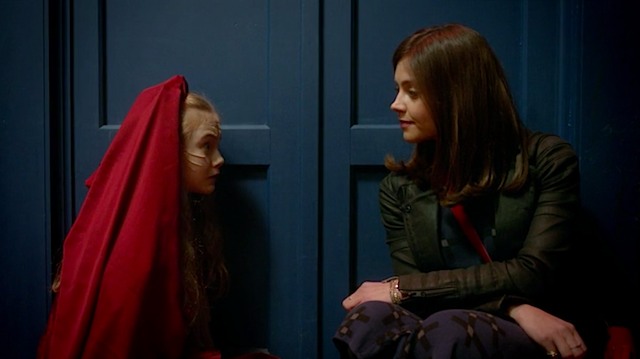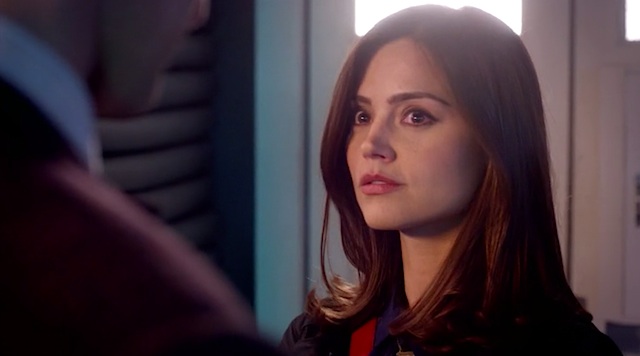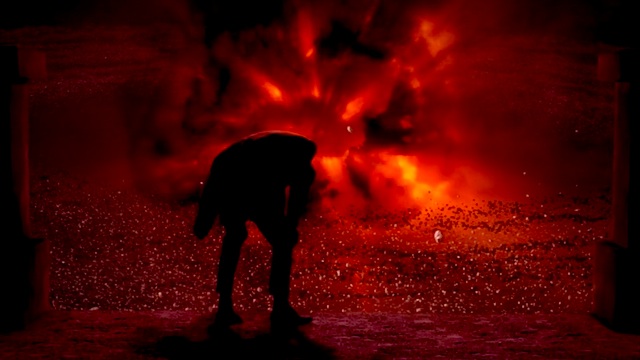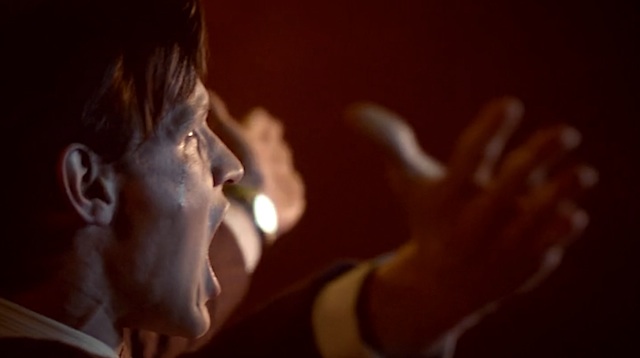In the 21st century, Doctor Who has always put a heavy amount of focus on season premieres and season finales. When a new dynamic is being introduced, whether that is a new Doctor or a new companion, the narrative of their introduction is always supported by several circuses’ worth of outlying publicity and viewer anticipation. “Rose,” “Smith and Jones,” “The Eleventh Hour,” and “The Bells of Saint John,” all debuted with this expectation and more or less performed admirably, even though Doctor Who stories aren’t really designed to withstand such scrutiny.
An oft-unspoken result of that scrutiny is that we usually don’t get to see what impact the new companion/Doctor will have going forward until the episode after their debut. “The End of the World,” “Gridlock,” and “The Beast Below” all carry this peculiar tone and “The Rings of Akhaten” is no different. Even though the episode makes no sense.
Spoilers for the episode (and the villain of the next) ahead.
These Episodes After share certain qualities: The Doctor explains the basics of the TARDIS/time travel/aliens in a clever way, the new companion goes off to explore on her own and stumbles into trouble, and circumstances result in the companion/Doctor realizing something that makes them want to continue traveling.
“The Rings of Akhaten” hits all of those marks and hits them well, conveying a satisfying emotional impact in a broad, almost literally operatic, manner. But it does so by divorcing them completely from the plot of the episode, creating a dissonance that makes anything aside from those moments feel non-existent.
Consider the confrontation between the Doctor and the parasitic god planet. After watching the episode I was hard-pressed to care about (or even remember) the details of how the Doctor got into that situation. They took a space motorcycle over, the Doctor pretended a door was heavy, Clara pretended to be stuck to the god’s glass case for what seemed like forever. Even though these events followed each other sequentially, they didn’t really cohere and I never cared about their resolution.
Instead, what kept me watching, and what ultimately made “The Rings of Akhaten” a surprisingly potent episode, were the interactions between the characters. An entire people lulling a god to sleep. The monk’s great sadness at being the one to end the song. The Doctor’s speech to the Queen of Years about her uniqueness. The Doctor telling Clara that they don’t walk away.
All of it leading to an unexpectedly intense confession between the Doctor and the god-planet. (It might be a sun. It’s called both in the episode.) Here we are reminded how large a being the Doctor truly is and how much he risks simply by traveling. Here is a man who is barred from nothing, including the greatest joys and the most terrifying depths that existence can cultivate. For the first time in his entire run, Matt Smith proved to me just how old the Doctor really is.
The episode offers a large number of these kinds of moments, and they all manage to impart new information to both new and long-time viewers even as they go through familiar rhythms.
Despite the Doctor’s aching vulnerability, Clara is by far the biggest revelation in the episode. Whereas the viewers knows Clara primarily as a mystery to be solved, “The Rings of Akhaten” busies itself with making Clara a person both to the viewer and to the Doctor himself. The episode opens with the story of how her mother and father met, how Clara came along, and how she subsequently lost her parents. These scenes inform Clara’s character when later she crouches behind the TARDIS, imparting confidence to a cowering Queen of Years in a motherly, if mournful, way.

This need to nurture is shown to be a key component of Clara’s character and for the rest of the episode she is never far from the Queen of Years, ready to support the child as she takes on the immense task of singing a hungry god to sleep. It’s quite a contrast from the Doctor, who is primarily there to see the spectacle of it and doesn’t particularly care about the Queen of Years until something goes wrong.
Her need to nurture eventually extends to the Doctor, and she sacrifices the greatest mementos of her past to save him and the people who live on the rings of Akhaten. Nevertheless, once she finds out the Doctor was spying on her as a child, she draws immediate boundaries between the two of them and reminds the Doctor and the viewer that even if she reminds us of someone we know she is not that person and should be considered on her own terms.
It comes as a shock to us and to the Doctor. Longtime viewers have become accustomed to companions being overwhelmed by the possibility and wonder that the Doctor represents. And the Doctor himself has become accustomed to using that wonder to roll onwards without bothering to explain, well, anything, if he can help it. Here we’re reminded that we really don’t know anything about Clara, even though we’ve seen her so many times before.
“The Rings of Akhaten” manages to rattle us with new revelations about the Doctor and Clara and underscores that the show and its characters are going in directions that we may not be anticipating. Despite his relative bounciness in “The Snowmen” and “The Bells of Saint John,” the Doctor is clearly still wounded and withdrawn thanks to the departure of the Ponds and the circumstances surrounding the Silence. And Clara….

While the episode accomplishes these revelations through some marvelous character interactions, the other aspects of “The Rings of Akhaten” are messy. We don’t really get to know or understand the society of the rings of Akhaten, so we don’t quite care about their struggle. What exposition there is sits like a hot mess right in the middle of the episode. (The scene with the alarm-clock-mummy beating on its cage went on FOR. EV. ER, right? It wasn’t just me?) The flimsiness of the plot seems to infect the characters themselves by the end. Does anyone care that an entire planet/sun/scary-face just disappeared, dooming Akhaten to a cold death as it drifts out into space? The Doctor, Clara, and the Queen sure didn’t seem to.
Still, I did like the sheer number of weird new aliens in the market and the Queen of Years came off as a realistic kid even through the space-fantasy plot. I also thought the lullaby-singing sequence itself did a good job at being genuinely beautiful while still building an effective sense of dread.
“The Rings of Akhaten” won’t go down as one of the better episodes of Doctor Who, but it gave us emotionally fraught moments that will linger far into the rest of the season, and perhaps beyond. It washes over you, leaving small deep pools behind. I now relate to the Doctor and Clara’s journey far more than I ever did after “The Bells of Saint John.” How it happened just doesn’t seem as important as the fact that it happened. This time, that’s enough.

Other tidbits:
- Does sexy/the TARDIS really not like Clara or did she just forget to use the key? If the former, then why? (Wait, does she even have a TARDIS key?)
- Alternate explanation: the TARDIS doesn’t have an opinion about Clara but knew the Queen of Years needed to be at the singing ceremony and not hiding inside an infinitely-sized spaceship.
- What changed on Clara’s street after she and the Doctor returned from the rings of Akhaten? How she sees the world, or something more material?
- The Doctor Who nostalgia train seems to have left the station, next stop the 50th anniversary. Second Doctor villain the Great Intelligence showed up in “The Snowmen,” the Doctor discards the coat of his tenth incarnation in “The Bells of Saint John,” and here he mentioned last visiting Akhaten with his granddaughter. Next week sees the return of old villains the Ice Warriors, as well.
- Not only did this episode share elements from Rose and the Ninth Doctor’s first post-debut adventure “The End of the World,” but Clara exhibits a lot of the same desires that Rose did. Namely, an urge to explore and an eye for small emotional details in seemingly commonplace people that the Doctor often disregards.
- Episode writer Neil Cross = not so closet Blade Runner devotee? “Home again, home again jiggety jig” and the partially misquoted “I’ve seen things you people wouldn’t believe” were both uttered in the ep.
- If next week’s “Cold War” reduces Clara back to a damsel in distress I will be so disappointed.
Chris Lough is the production manager of Tor.com and has walked through websites where the laws of blogging were created by a mad man.










